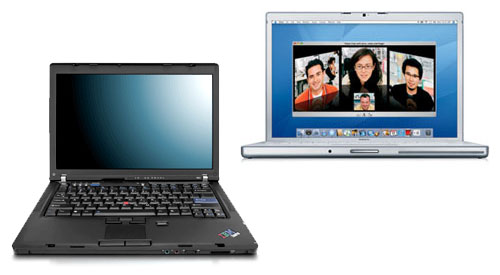Hosted by site sponsor WebMate.
MacBook Pro Q&A - Revised June 7, 2007
To be notified of new Q&As, sign up for EveryMac.com's bimonthly email list.
How does the MacBook Pro "Core 2 Duo" 15-Inch compare to a similar Core 2 Duo Windows notebook?
Please note that all systems mentioned in this Q&A have been discontinued. The "Late 2006" MacBook Pro "Core 2 Duo" models were replaced by the "Mid-2007" MacBook Pro Core 2 Duo "Santa Rosa" series on June 5, 2007.
For the original MacBook Pro 15-Inch, EveryMac.com compared the notebook to the Acer TravelMate 8200 and the Lenovo ThinkPad Z61m. Based on feedback, the majority of readers preferred the comparison to the ThinkPad, as IBM had the reputation for providing the "gold standard" in the Windows notebook world. It will be interesting to see if Lenovo continues to meet those expectations for quality.
For the MacBook Pro "Core 2 Duo" 15-Inch, the Apple notebook compares quite favorably to the latest Core 2 Duo powered ThinkPad Z61m.

Photo Credit: Lenovo (Left) & Apple Computer (Right)
The upgraded ThinkPad Z61m is quite similar to its predecessor with the exception of a 2.0 GHz Intel "Core 2 Duo" (T7200) processor and support for 3 GB of 667 MHz PC2-5300 DDR2 SDRAM (SO-DIMM), compared to 2 GB of memory in the models replaced. The slowest MacBook Pro -- the MacBook Pro "Core 2 Duo" 2.16 15-Inch -- has a 2.16 GHz Intel "Core 2 Duo" processor and also supports 3 GB of the same type of memory.
The MacBook Pro and the ThinkPad, as configured, both have 120 GB GB 5400 RPM Serial ATA hard drives with anti-shock technology designed to stop the hard drive heads from moving if the laptop is dropped or jolted suddenly (the "Sudden Motion Sensor" for the MacBook Pro and the "Active Protection System" for the ThinkPad), as well as dual layer DVD burners (6X maximum for the MacBook Pro and 8X maximum for the ThinkPad).
Like the predecessors of each notebook, the MacBook Pro "Core 2 Duo" has an ATI Mobility Radeon X1600 graphics processor that supports an external display at a maximum resolution of 2560x1600 and the ThinkPad has ATI Mobility Radeon X1400 graphics that support an external display at no larger than 2048x1536. There are other differences as well, but to generalize, the X1400 used in the ThinkPad is slower. For complete differences between the graphics cards, please refer to the applicable specifications for the X1400 and X1600 from ATI.
Both the Apple and Lenovo also have 802.11a/b/g support (dubbed AirPort Extreme on the MacBook Pro), Bluetooth (2.0+EDR specified for the MacBook Pro), Gigabit Ethernet, a FireWire "400" port, an ExpressCard/34 expansion slot, and an integrated video camera. However, there are other ports that are provided by one notebook or the other (summarized below).
The MacBook Pro has a 15.4" widescreen TFT active-matrix display (1440x900 native) and the ThinkPad has a display of the same size that is higher-resolution than the MacBook Pro (1680x1050 native).
There are a handful of other configuration differences, summarized below for your convenience:
| Core 2 Duo Systems | ThinkPad Z61m | MacBook Pro 2.16 15" |
|---|---|---|
| Processor Speed: | 2.0 GHz | 2.16 GHz |
| Intel Processor: | T7200 | T7400 |
| ATI Mobility Radeon Graphics: | X1400 | X1600 |
| Native Resolution: | 1680x1050 | 1440x900 |
| Input Devices: | Trackpoint/Trackpad | Trackpad |
| Biometrics: | Fingerprint Scanner | None |
| Different Ports: | 3 USB 2.0 Infrared S-Video Out VGA Out Dock/Port Replicator Type II PC Card Slot 3-in-1 Card Reader 56k v.92 Modem |
2 USB 2.0 1 Firewire "800" Optical Digital Audio In/Out DVI Out |
| Weight: | 7.1 lbs. | 5.6 lbs. |
| Operating System: | Windows XP Pro | MacOS X |
| Price (As Configured): | US$1679 | US$1999 |
The Lenovo system lacks the fiber-optic-based "ambient light sensor" that automatically "measures ambient light and works with integrated software to adjust keyboard illumination and screen brightness based on user preferences" but it does have the "ThinkLight keyboard light" which is an LED that is "located on the top edge of the display" to illuminate the keyboard in low light. The Lenovo also lacks the remote and the magnetically connected "MagSafe" power connector provided by the Apple system. The Apple system, on the other hand, unfortunately lacks the biometric reader.
As is common for Windows notebooks, the ThinkPad is a full pound and a half heavier and arguably less attractive than the MacBook Pro. The ThinkPad costs US$320 less, but this is with a slower processor and inferior graphics.
Additionally, as with all the other comparisons, Apple does not support running MacOS X on the Lenovo system, and regardless of the underlying hardware and feature set, that remains perhaps the most important distinction.
Permalink | Report an Error/Typo | Sign Up for Site Update Notices
Established in 1996, EveryMac.com has been created by experts with decades of experience with Apple hardware. EveryMac.com includes, and always has included, original research incorporating detailed, hands-on inspection of packaging, computers, and devices as well as extensive real-world use. All information is provided in good faith, but no website or person is perfect. Accordingly, EveryMac.com is provided "as is" without warranty of any kind whatsoever. EveryMac.com, and the authors thereof, shall not be held responsible or liable, under any circumstances, for any damages resulting from the use or inability to use the information within. For complete disclaimer and copyright information please read and understand the Terms of Use and the Privacy Policy before using EveryMac.com. Copying, scraping, or use of any content without expressed permission is not allowed, although links to any page are welcomed and appreciated.
